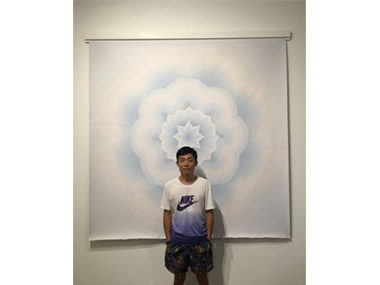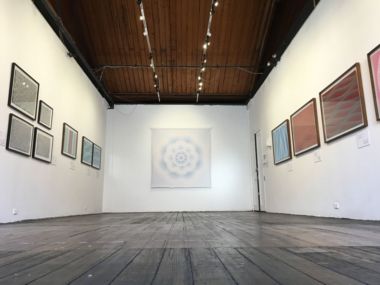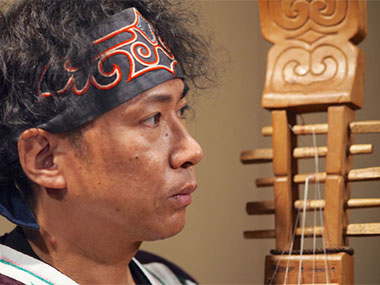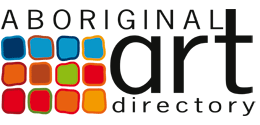Japanese 'Didg' Star in Sydney

Goma standing in front of one of his artworks on show in 2016 at Melbourne's Backwoods Gallery. Image courtesy of the artist
Posted by Jeremy Eccles | 07.02.17
Dates:
25.02.17
News Source: Press Release
Japanese artist and musician, Hiroki Morimoto, more popularly known as the artist Goma, is being brought to Sydney for the first time by The Japan Foundation for a special performance of his didgeridoo music for one night only on Saturday, 25 February. For this special performance he will collaborate with local artists.
Born in Osaka in 1973, Goma first encountered the didgeridoo in 1994 when his friends brought one home from England’s Glastonbury music festival. Three years later, he was working in a didgeridoo shop in Darwin, an Aboriginal friend took him to Arnhem Land where he studied the instrument under master Djalu Gurruwiwi and went on to become the first non-Indigenous person to win the Northern Land Council prize at the 1998 Barunga Didgeridoo Competition. During this time, Goma lived with the Yolngu people and was adopted into the Galpu clan.
Upon returning to Tokyo two years later, Goma founded Jungle Rhythm Section, a highly respected band which blends Jungle and World Music with Goma’s contemporary interpretation of the didgeridoo.
Goma’s passion for the didgeridoo helped him enormously after a life changing event in 2009 when he was involved in a near-fatal car accident resulting in traumatic cerebral damage. Suffering from amnesia, he struggled to form new memories. His surgeon, knowing his love of the didgeridoo, suggested that one be brought to his bedside. This helped him with his long process of rehabilitation as he slowly started to recall how to play.
Just days after coming out of his coma, Goma also felt the compulsion to paint. Picking up his daughter's paint set, he started work on a series of striking dot paintings. Goma’s artwork bears some resemblance to Indigenous dot paintings but is infused with classic Japanese aesthetics and landscapes. His intention was not to appropriate Indigenous art. Instead, as with the didgeridoo, he has embraced it as a source of inspiration and strength while creating a cultural bridge.
In 2013, director Tetsuaki Matsue released Flashback Memories, an award-winning documentary on Goma’s life, music and art. The success of the documentary resulted in international recognition of Goma’s remarkable story. Goma has released 8 albums: 7 before his accident and 1 album after his accident. In 2012, he started the Jungle Didgeridoo Circle, a school in Tokyo where he continues to teach the didgeridoo/yidaki to all ages from children to adults.
The Japan Foundation has also organised a series of talks around Goma's visit - see below.
Event Details:
Echoes
Goma will perform in Sydney only
Date and time: Saturday 25 February, 3pm (90 minutes)
Venue: John Painter Hall at the Australian Institute of Music
1-55 Foveaux Street, Surry Hills
Admission: This is a free event.
Bookings essential via Eventbrite or phone 02 8239 0055.
Talk: Discovering Goma’s Story
Date and time: Thursday 23 February at 6.30pm (60 minutes)
Venue: The Japan Foundation, Sydney
Level 4 Central Park, 28 Broadway Chippendale NSW 2008
Admission: This is a free event.
For bookings, visit The Japan Foundation
In conversation with Riley Lee and Matthew Doyle
Shakuhachi Grand Master Riley Lee and Indigenous performing artist Matthew Doyle will talk about cross-cultural musical collaborations with the shakuhachi and the didgeridoo. The talk will be hosted by Dr Allan Marett of the Sydney Conservatorium of Music and will include a short performance by Lee and Doyle.
Date and time: Thursday 9 February, 6:30pm (90 minutes)
Venue: The Japan Foundation, Sydney
Level 4 Central Park, 28 Broadway Chippendale NSW 2008
Admission: This is a free event.
For bookings, visit The Japan Foundation
Talk: Ainu Sounds: Indigenous Music from Japan Nobuhiko ‘Sanpe’ Chiba
Touching on the culture and values of Japan's Indigenous Ainu people, this event offers a privileged glimpse into Ainu musical traditions. Performer and researcher Nobuhiko Chiba (Ainu name: Sanpe) will illuminate Ainu culture's intriguing approach to music and song, followed by live demonstrations of Ainu instruments: the tonkori and mukkuri. The tonkori is a traditional five-stringed harp unique to northern Japan’s indigenous Ainu culture. The repetition of simple melodies on the harp is said to evoke a variety of different landscapes.
Date and time: Thursday 10 March, 6:30pm (90 minutes)
Venue: The Japan Foundation, Sydney
Level 4 Central Park, 28 Broadway Chippendale NSW 2008
Admission: This is a free event.
For bookings, visit The Japan Foundation
Share this:
»  del.icio.us
»
del.icio.us
»  Digg it
»
Digg it
»  reddit
»
reddit
»  Google
»
Google
»  StumbleUpon
»
StumbleUpon
»  Technorati
»
Technorati
»  Facebook
Facebook
Contact Details

The installation of Goma's artworks at Backwoods Gallery. Image courtesy of the artist

Ainu musician Nobuhiko ‘Sanpe’ Chiba with his tonkori, which he'll play in Sydney on March 10th.
Further Research
News Tags: Ainu music | didgeridoo | Goma | Japan Foundation | Jeremy Eccles | yidaki | Yolgnu
News Categories: Blog | Event | Lecture | News | Other Event
Exhibition Archive
- 10.10.17 | TARNANTHI 2017
- 11.08.17 | Natsiaas 2017
- 20.07.17 | APY ART DOMINATES THE WYNNE
- 17.07.17 | Anangu Artist Wins $100,000 Prize
- 14.07.17 | The End of AAMU
- 11.07.17 | ART ACROSS THE COUNTRY
- 11.07.17 | TARNANTHI IN OCTOBER
- 05.07.17 | TJUNGUṈUTJA - from having come together
- 13.06.17 | Ghost-Nets Straddle the World
- 07.06.17 | Grayson Perry Going Indigenous?
- 05.06.17 | Barks Bigger than Ben Hur
- 27.05.17 | NGA QUINQUENNIAL 2017
- 21.05.17 | Blak Douglas Finds Home at the NGA
- 21.05.17 | BRIAN ROBINSON WINS HAZELHURST WOP
- 18.05.17 | PARRTJIMA 2.0
Advertising

